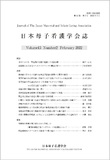Japanese
English
- 有料閲覧
- Abstract 文献概要
- 参考文献 Reference
抄録
【目的】本研究の目的は、緊急帝王切開の実施決定に関与した夫の分娩体験を明らかにすることである。
【対象と方法】研究デザインは質的記述的研究である。期間は、2015年10月から11月である。研究対象者は、緊急帝王切開で出産した産婦の夫7名を対象とした。出産した施設は、2つの病院で年間500〜700件程度の分娩件数である。選択条件は、立ち会い出産を希望し緊急帝王切開決定時もそばに付き添っていた夫であること。更に緊急帝王切開後の母児は健康であることとした。データは、緊急帝王切開で出産した産婦の夫の語りをインタビューガイドに基づく半構成的面接によって収集した。分析は、内容を逐語録としてデータ化し研究テーマに関連した内容を抽出しカテゴリー化した。
【結果】緊急帝王切開の決定に関する夫の体験を手術前、手術を医師から告げられた時、手術を同意した時点に分けて分析し、10のカテゴリーと28のサブカテゴリーに分類した。手術前のカテゴリーは、【分娩経過に対する危惧】【胎児の生命の危機感】【無力感】【妻への畏敬】【客観的な情報収集】であった。手術と告げられた時のカテゴリーは、【安堵感】【帝王切開への動揺】である。手術を受け入れていく段階のカテゴリーは、【想定外の帝王切開】【医師を信じて命を託す】【心から納得した選択】である。
【結論】手術を受け入れていく段階における夫の体験は、母体と胎児の状況変化により感情が揺れ動き、同時に自ら情報を収集して状況を客観的に判断しようとしていた。また、夫にとって緊急帝王切開の決定に関わる体験は、緊急帝王切開を納得して了解することで夫自身も分娩に介入したと実感できる意味のある分娩の体験であることが明らかになった。
【Purpose】The aim of the present study was to identify the experiences of husbands involved in the decision-making process to perform an emergency cesarean section.
【Method】The research design was a qualitative descriptive study, with a study period of October to November 2015. The study population consisted of seven husbands who were involved in the decision to perform emergency cesarean section, in two hospitals, each of which have approximately 500 to 700 deliveries per year. The inclusion criteria for the participants were: husbands who were present at delivery; husbands present when the decision to perform emergency cesarean section was made; and a healthy mother and child following the procedure. Data were collected using semi-structured interviews based on an interview guide with the husbands involved in the decision to have an emergency cesarean section. The analysis began with verbatim transcripts of the interviews, which were then categorized according to the research theme.
【Results】The husbands' experiences related to the decision to have an emergency cesarean section were divided into three categories; "before being told of the surgery" "when the doctor told me about the surgery," and "when they agreed to the surgery," with a further 10 categories and 28 subcategories. The categories before being told of the surgery the surgery were: fear regarding the success of the delivery; concern for the life of the fetus; helplessness; respect for his wife; and objective information gathering. The categories when the doctor told them about the surgery were: upset about the decision to perform a cesarean section; and relief. The categories at the stage of the husbands' agreement to surgery were: unexpected cesarean section; trusting the doctor with his life; and making a choice he was truly convinced of.
【Conclusion】The general experience of the husbands during the stage of agreeing to the surgery was one of emotional turmoil due to changes in the situation of the mother and the fetus, while at the same time trying to gather information and judge the situation objectively by themselves. For the husband, the experience of being involved in the decision to have an emergency cesarean section was found to be a meaningful experience, in which the husband himself felt that he had intervened in the delivery by agreeing to the surgery.
Copyright © 2022, The Japan Maternal and Infant Caring Association All rights reserved.


